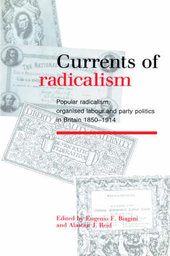
|
Currents of Radicalism: Popular Radicalism, Organised Labour and Party Politics in Britain, 1850-1914
Hardback
Main Details
| Title |
Currents of Radicalism: Popular Radicalism, Organised Labour and Party Politics in Britain, 1850-1914
|
| Authors and Contributors |
Edited by Eugenio F. Biagini
|
|
Edited by Alastair J. Reid
|
| Physical Properties |
| Format:Hardback | | Pages:320 | | Dimensions(mm): Height 237,Width 160 |
|
| Category/Genre | British and Irish History
World history - c 1750 to c 1900 |
|---|
| ISBN/Barcode |
9780521394550
|
| Classifications | Dewey:324.241009 |
|---|
| Audience | | Professional & Vocational | | General | | Tertiary Education (US: College) | |
|---|
|
Publishing Details |
| Publisher |
Cambridge University Press
|
| Imprint |
Cambridge University Press
|
| Publication Date |
28 June 1991 |
| Publication Country |
United Kingdom
|
Description
'Those who were originally called radicals and afterwards reformers, are called Chartists', declared Thomas Duncombe before Parliament in 1842, a comment which can be adapted for a later period and as a description of this collection of papers: 'those who were originally called Chartists were afterwards called Liberal and Labour activists'. In other words, the central argument of this book is that there was a substantial continuity in popular radicalism throughout the nineteenth and into the twentieth century. The papers stress both the popular elements in Gladstonian Liberalism and the radical liberal elements in the early Labour party. The first part of the book focuses on the continuity of popular attitudes across the commonly-assumed mid-century divide, with studies of significant personalities and movements, as well as a local case study. The second part examines the strong links between Gladstonian Liberalism and the working classes, looking in particular at labour law, taxation, and the Irish crisis. The final part assesses the impact of radical traditions on early Labour politics, in Parliament, the unions, and local government. The same attitudes towards liberty, the rule of law, and local democracy are highlighted throughout, and new questions are therefore posed about the major transitions in the popular politics of the period.
|